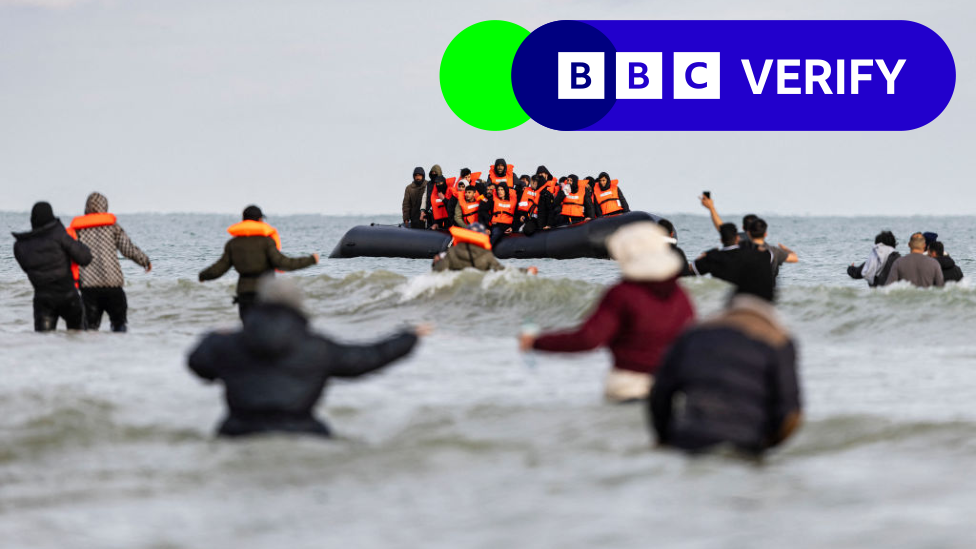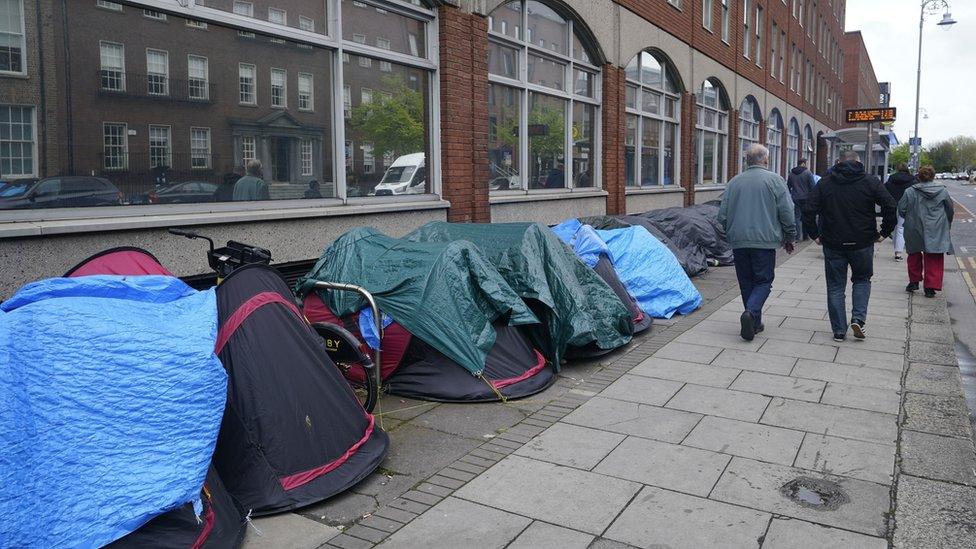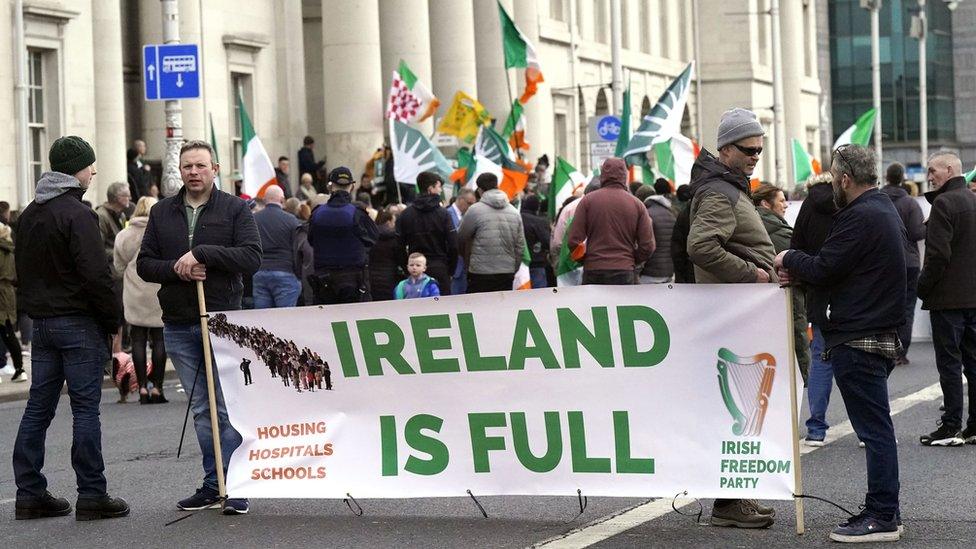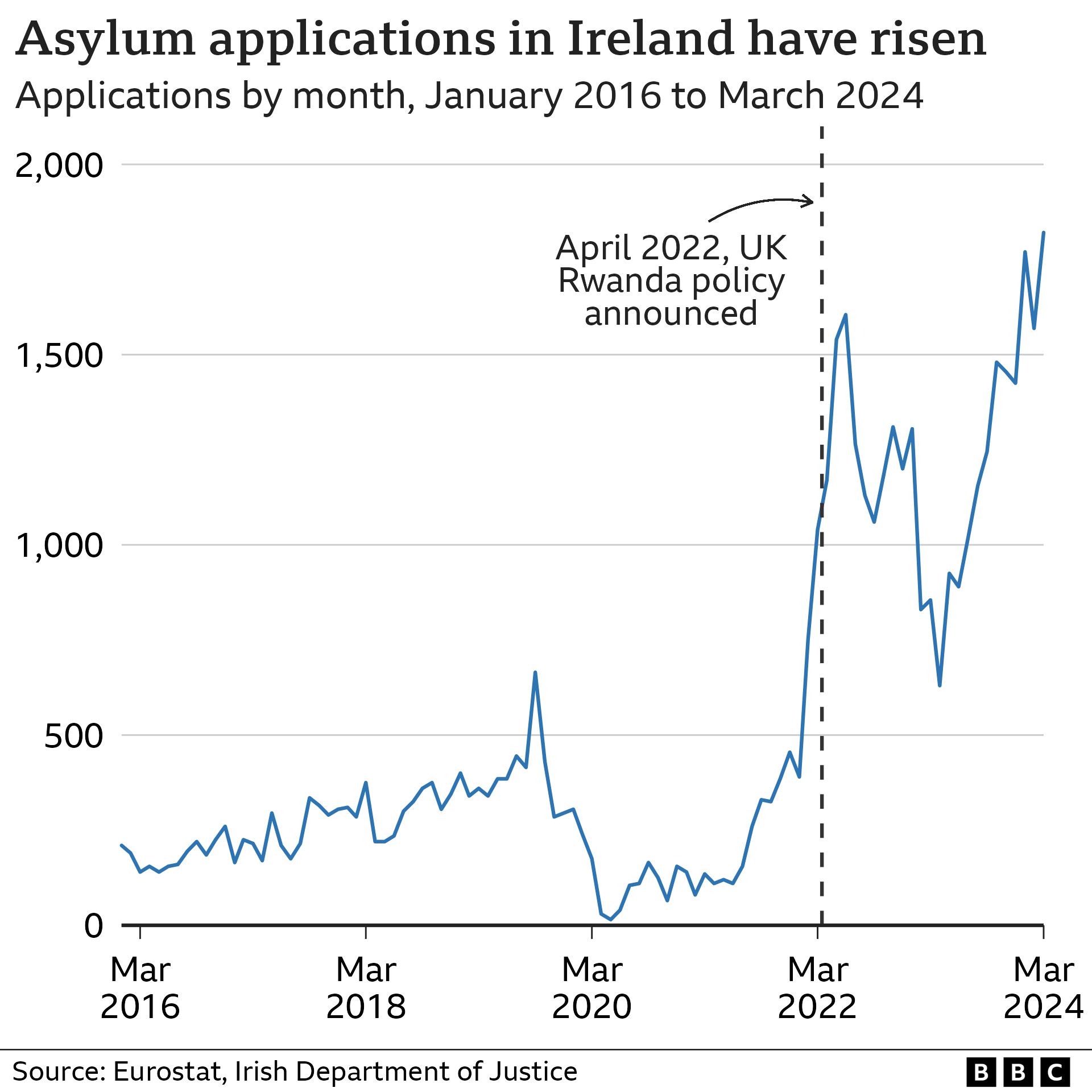Is the Rwanda policy driving migrants to Ireland?
- Published

The number of people claiming asylum in Ireland has risen, with the Irish government claiming 80% have arrived from Northern Ireland, external.
It has blamed the Rwanda policy, external - the fear of deportation - for the increase, and wants to send migrants back to the UK.
Ireland's deputy leader said the 80% figure was not "data-based" but is standing by the claim. British Prime Minister Rishi Sunak says "the deterrent is... already having an impact".
BBC Verify has been looking at the rise in asylum claims in the Irish Republic and whether the Rwanda scheme is behind it.
What is happening with asylum claims in Ireland?
The 80% claim was made by Ireland's justice minister, Helen McEntee.
She told the Irish parliament, external that "a significant proportion of people are coming through the border now... I would say higher than 80%".
The border she was referring to is the land border between Northern Ireland and Ireland - an open border with no routine checks on people crossing it.
BBC Verify contacted the Irish government to request data to support her claim but it did not provide this.
We also contacted the Irish Central Statistics Office (CSO) and the UN refugee agency (UNHCR) in Ireland.
Both replied that there are no publicly available statistics on how asylum seekers enter Ireland.
However, the Irish justice ministry told us that 91% of asylum seekers - or 6,136 of a total of 6,739 who applied for protection this year - did so at an office which deals with asylum applications, called the International Protection Office (IPO), in Dublin, rather than at a port or airport.
This, it says, suggests a majority of asylum seekers are entering the country via the land border, rather than by sea or air.
It said its "firm assessment" was based "on the experience of staff and others working in the field, and based on the material gathered at interviews".
But Nick Henderson, CEO of the Irish Refugee Council, said: "Just because a person has not applied for protection at an airport or port it does not automatically mean the person has crossed the border from Northern Ireland.
"They may not want to apply at the airport or port because they think they will be placed back on the flight and returned."
On Monday, Tánaiste (Irish deputy PM) Micheál Martin was asked for evidence about the 80% claim.
He said: "It's not a statistical... it's not a data-based sort of evidence base, but it is very clear from the presentations when migrants come that there's a change in the nature of where migrants have come from".

Tents housing asylum seekers near Dublin's International Protection Office
Recent images have shown lines of tents housing asylum seekers near the IPO in Dublin.
The BBC spoke to a 22-year-old man from India who is living in one of the tents. He said he had been studying in the UK but his visa had expired and he had left because "they made strict rules".
He said he had travelled to Northern Ireland by ferry and then got on a bus to Dublin, saying "I came for good opportunities".
We were unable to verify his journey but the ferry companies we spoke to told us they do not ask for an ID or passport when people book tickets and there are no routine checks of documents when people arrive in Northern Ireland.
In Ireland, tensions have been rising over the increase in asylum seekers, with protests taking place in Dublin and other parts of Ireland, external.

Protesters at a rally in Dublin in February
Is the Rwanda policy behind the rise?
Mr Martin has blamed the UK's Rwanda policy for an increase in Ireland's asylum seeker applications., external He also did so in 2022 when the Rwanda plan was at an early stage of development.
At the time, Sky News reported, external that the Irish Red Cross had partially blamed the Rwanda scheme for a sharp increase of asylum seekers in the first half of 2022.

But while the number of asylum seekers in Ireland has risen sharply in recent years, Mihnea Cuibus - a researcher for the Migration Observatory at the University of Oxford - says there is not enough evidence to say whether the Rwanda policy "plays a role".
He said: "The number of monthly asylum applications in Ireland rose fairly rapidly at the end of 2021 - a couple of months before the Rwanda plan was announced and has fluctuated somewhat since then.
"This indicates that the Rwanda plan wasn't responsible for driving this initial growth... many European countries, including the UK saw growth in the number of asylum applications they received over the same period."
Additional reporting by Gerry Georgieva

